Error message
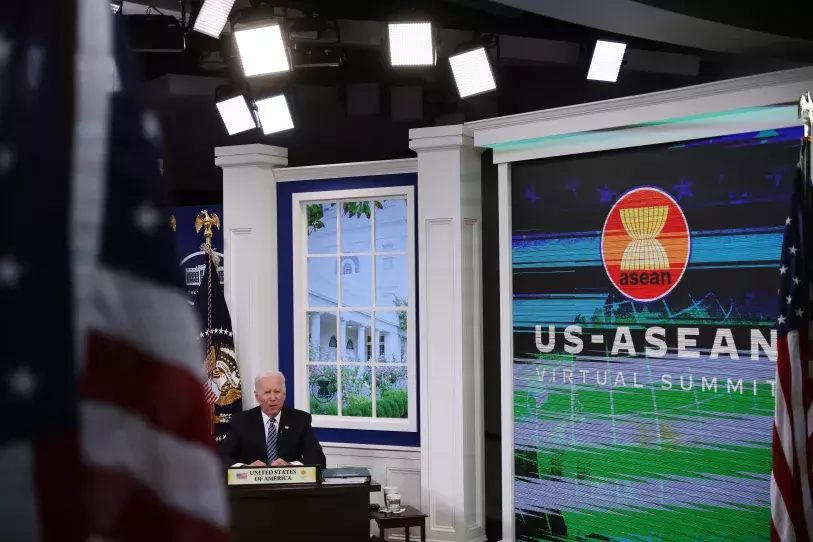
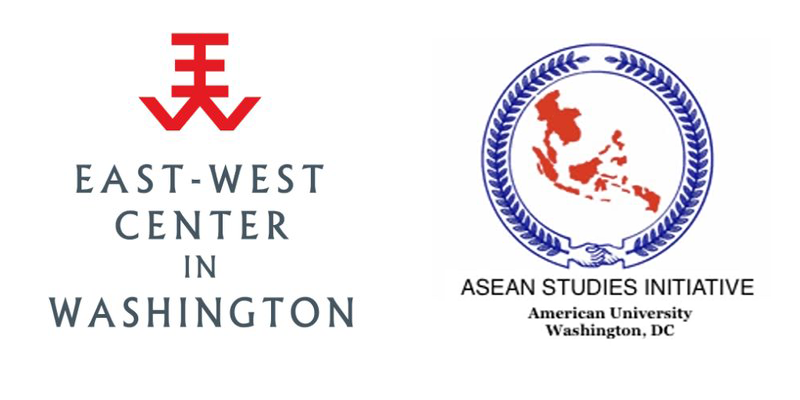
The East-West Center in Washington and American University’s ASEAN Studies Initiative
invite you to an Indo-Pacific Series Webinar:
Assessing US-ASEAN Relations:
The 2022 Special Summit and Beyond
Featuring:
Dr. Amitav Acharya (Welcome Remarks)
Chair, ASEAN Studies Initiative,
School of International Service, American University
Keynote Remarks
Mr. Daniel J. Kritenbrink
Assistant Secretary, Bureau of East Asian and Pacific Affairs,
US Department of State
Fireside Chat: Economic Outcomes of the Special Summit
Mr. Marc Mealy
Senior Vice President-Policy,
US-ASEAN Business Council
Mr. Edmund Sim,
Partner, Appleton Luff
Fireside Chat: Political-Security Outcomes of the Special Summit
Mr. Murray Hiebert
Senior Associate, Southeast Asia Program,
Center for Strategic and International Studies
Dr. Cheng-Chwee Kuik
Head and Associate Professor, Centre for Asian Studies (iKAS),
Institute of Malaysian and International Studies (IKMAS),
National University of Malaysia (UKM)
Mr. Kavi Chongkittavorn
Senior Fellow, Institute of Security and International Studies,
Chulalongkorn University
Fireside Chat: Socio-Cultural Outcomes of the Special Summit
Mr. John J. Brandon
Senior Director, International Relations Programs and Associate Director, Washington DC,
The Asia Foundation
Dr. Mely Caballero-Anthony
Professor of International Relations, Head of Centre for Non-Traditional Security Studies, and President’s Chair in International Relations and Security Studies,
S. Rajaratnam School of International Studies, Nanyang Technological University, Singapore
Dr. Quang Minh Pham
Professor of History and Politics, and Chair, Department of International Development Studies,
University of Social Sciences and Humanities (USSH), Vietnam National University-Hanoi &
Fulbright Fellow, Weatherhead East Asian Institute, Columbia University
Moderators
H.E. Piper Campbell
Acting Director, ASEAN Studies Initiative, School of International Service, American University &
Former Head of the US Mission to the Association of Southeast Asian Nations (ASEAN)
Dr. Satu P. Limaye
Vice President, East-West Center &
Director, East-West Center in Washington
East-West Center in Washington · Assessing US-ASEAN Relations: The 2022 Special Summit and Beyond
Following the recently concluded US-ASEAN Special Summit on May 12-13, 2022 in Washington, DC, US and regional experts discussed the extent to which the summit advanced US and ASEAN interests in the three main areas of ASEAN endeavors: political-security, economic, and socio-cultural.
SPEAKER BIOGRAPHIES
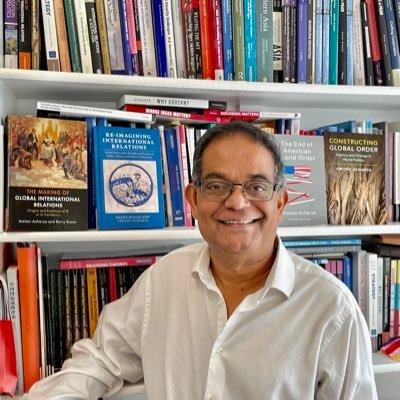
Dr. Amitav Acharya is Chair of the ASEAN Studies Initiative and Professor of International Relations at the School of International Service, American University, Washington, DC. He also holds the UNESCO Chair in Transnational Challenges and Governance since 2011. He was previously Professor of International Relations at York University in Toronto and Professor of Global Governance at the University of Bristol in the UK. He has also taught at the National University of Singapore and Nanyang Technological University, Singapore. He was a Fellow of the Asia Center, Harvard University, and Fellow of the Center for Business and Government at Harvard’s John F. Kennedy School of Government. Professor Acharya was elected to the Christensen Fellowship at St Catherine’s College in Oxford in 2012 and held the Nelson Mandela Visiting Professorship in International Relations at Rhodes University, South Africa for 2012-13. He was elected to be the President of the International Studies Association (ISA), the most recognized and influential global network of international studies scholar worldwide, for 2014-15. As the first ISA President from outside the West, he promoted the idea of Global IR, with the goal of injecting more diversity into the study of international relations and making it into a more dynamic and inclusive discipline and overcoming its hitherto neglect of the voices and experiences of the Global South. His areas of research and writing include Southeast Asian affairs, Asian security, international relations theory, and comparative regionalism. He has published widely on Southeast Asian and Asian regionalism, and the diffusion of ideas and norms in world politics.
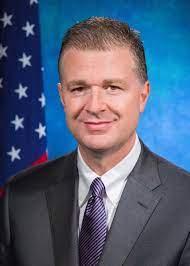
Daniel J. Kritenbrink became Assistant Secretary of State for East Asian and Pacific Affairs on September 24, 2021. A career member of the Senior Foreign Service, Class of Career Minister, Kritenbrink has been an American diplomat since 1994. Assistant Secretary Kritenbrink previously served as U.S. Ambassador to the Socialist Republic of Vietnam (2017-2021), Senior Director for Asian Affairs at the National Security Council (2015-2017), and Deputy Chief of Mission at the U.S. Embassy in Beijing (2013-2015). He also completed multiple other overseas tours in Beijing, Tokyo, Sapporo, and Kuwait City. His other Washington assignments have included Director of the Office of Chinese and Mongolian Affairs at the Department of State and Staff Assistant to the Assistant Secretary of State for Near Eastern Affairs. A Nebraska native, Assistant Secretary Kritenbrink earned a master’s degree at the University of Virginia, and a bachelor’s degree at the University of Nebraska-Kearney. He speaks Chinese and Japanese.
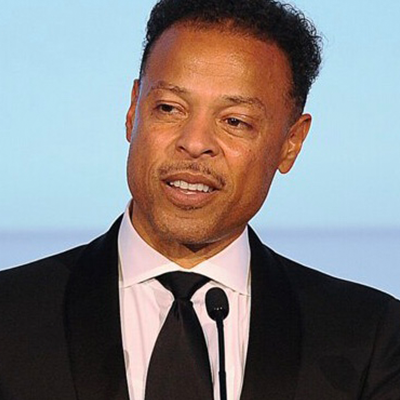
Marc Mealy is the Senior Vice President-Policy at the US-ASEAN Business Council. He manages the production of the Council’s information products, coordinates advocacy efforts across our country and industry committees, and serves as the in-house lead on international trade policy. He joined the Council in 2003 as the Senior Director for Malaysia, Philippines and Brunei Affairs as well as Coordinator of the Council's ASEAN Financial Services Working Group. He was named the Vice President in 2010. Marc has over twenty years of experience in international trade and economics. He began his professional career in 1989 as an international economist with International Trade Policy Division of USDA's Foreign Agricultural Services. While at USDA he was accepted into the United States Foreign Service, and later went on to manage some of USDA’s largest commodity trade finance (GSM) and food assistance programs (PL-480) in Asia, Africa, and Eastern Europe for USDA’s Commodity Credit Corporation. In 1994-1996, he joined the African American Institute, an international non-profit NGO, as the Director of its Trade and Investment Program and later worked as a consultant to foreign government and international development NGO’s. Prior to joining the Council Marc spent four years inside the U.S. Congress. From 1999-2001 he was a member of the Professional Staff of the House International Relations Committee. From 2001 to 2003, he served as the international economic and foreign policy advisor to Congressmen Gregory Meeks of New York, a member of the House Foreign Affairs and Financial Services Committees. Marc holds a B.A. in Economics and Third World Studies from Oberlin College and an M.S. degree in Economics from the University of Florida.
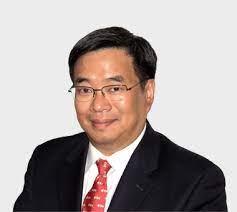
Edmund Sim is a partner at Appleton Luff, an international law firm. He was an Adjunct Associate Professor at National University of Singapore Law School, where he created the world’s first course on ASEAN Economic Community (AEC) law. Ed has participated in more than 250 trade remedy proceedings and has advised government ministries in Malaysia, Thailand, Singapore, the Philippines, Vietnam, Laos, Cambodia, Timor-Leste, Indonesia and the ASEAN Secretariat. Ed advises the government of Timor-Leste on its accession to ASEAN. He co-authored The Foundation of the ASEAN Economic Community and Rules of Origin in ASEAN: A Way Forward (Cambridge, 2015) with Stefano Inama. He also served as Vice Chair and Treasurer of the American Chamber of Commerce in Singapore. During university, he worked at the Office of U.S. Vice President George H.W. Bush and the Office of the General Counsel, U.S. Treasury Department. Ed graduated from the University of Michigan Law School and Dartmouth College.
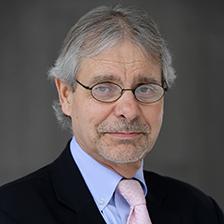
Murray Hiebert is a senior associate of the Southeast Asia Program at the Center for Strategic and International Studies (CSIS) in Washington, D.C. He earlier served as senior adviser and deputy director of the CSIS Southeast Asia Program. Prior to joining CSIS, Mr. Hiebert was senior director for Southeast Asia at the U.S. Chamber of Commerce. Earlier, he was a journalist in the China bureau of the Wall Street Journal. Prior to his posting to Beijing, he worked for the Wall Street Journal Asia and the Far Eastern Economic Review in Washington, reporting on U.S.-Asia relations. From 1995 to 1999, he was based in Kuala Lumpur for the Far Eastern Economic Review. In the early 1990s, he was based in Hanoi for the Review. He joined the Review's Bangkok bureau in 1986, covering developments in Vietnam, Cambodia, and Laos. Mr. Hiebert is the author of two books on Vietnam, Chasing the Tigers (Kodansha, 1996) and Vietnam Notebook (Review Publishing, 1993).
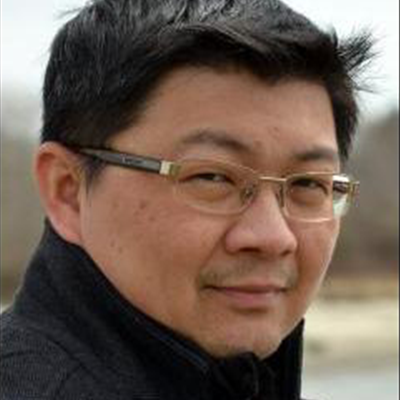
Dr. Cheng-Chwee Kuik (郭清水) is an Associate Professor and Head of the Centre for Asian Studies at the National University of Malaysia (UKM)’s Institute of Malaysian and International Studies (IKMAS), and concurrently a Nonresident Fellow at Johns Hopkins Foreign Policy Institute (FPI). He is co-founder of the East Asian International Relations (EAIR) Caucus, a research platform for exchange, engagement, and empowerment among foreign affairs professionals in Malaysia. He served as Head of the Writing Team for the Government of Malaysia’s inaugural Defence White Paper (2020). Previously he was a postdoctoral research associate at the Princeton-Harvard “China and the World” Program (CWP) and a visiting research fellow at Oxford's Department of Politics and International Relations. Dr. Kuik’s research concentrates on weaker states’ foreign policy behavior, regional multilateralism, East Asian security, China-ASEAN relations, and Malaysia’s external policy. His publications have appeared in peer-reviewed journals such as Journal of Contemporary China, Contemporary Southeast Asia, Chinese Journal of International Politics, Asian Security, China: An International Journal, Asian Politics and Policy, East Asian Policy, Shijie Jingji yu Zhengzhi, as well as edited books. He is co-author (with David M. Lampton and Selina Ho) of Rivers of Iron: Railroads and Chinese Power in Southeast Asia (University of California Press, October 2020), and co-editor (with Alice Ba and Sueo Sudo) of Institutionalizing East Asia: Mapping and Reconfiguring Regional Cooperation (Routledge 2016). Dr. Kuik's essay, “The Essence of Hedging” was awarded the biennial 2009 Michael Leifer Memorial Prize by the Institute of Southeast Asian Studies for the best article published in any of the three ISEAS journals. Cheng-Chwee is a regular invited speaker to international conferences and closed-door policy roundtables. His current projects include: hedging in international relations, geopolitics of infrastructure connectivity cooperation in Asia, and domestic sources of Southeast Asian states’ BRI engagement. Kuik serves on the editorial boards/committee of Contemporary Southeast Asia, Australian Journal of International Affairs, Asian Perspective, and Routledge’s “IR Theory and Practice in Asia” Book Series. He holds an M.Litt. from the University of St. Andrews, and a PhD from the Johns Hopkins University’s School of Advanced International Studies.
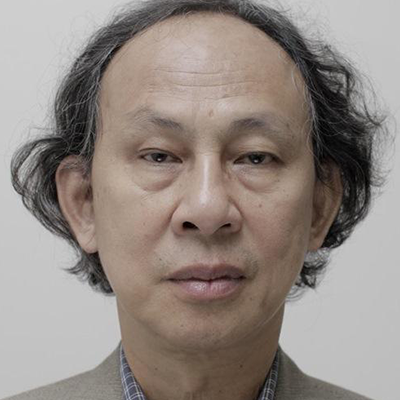
Kavi Chongkittavorn is a senior fellow at Chulalongkorn University’s Institute of Security and International Studies. He has been a journalist for over three decades with the Bangkok-based English-language newspaper The Nation, first as correspondent in Phnom Penh and Hanoi and later as leading writer and editor. He served as special assistant to the secretary general of ASEAN from 1995 to 1996 before returning to journalism. Kavi was a Nieman Fellow at Harvard University from 2001 to 2002 and president of the UNESCO Guillermo Carno World Press Freedom Prize jury from 2004 to 2007. He is the current affairs commentator of Nation News Channel’s One World Program. Kavi’s column, Regional Perspective, is in its 30th year.
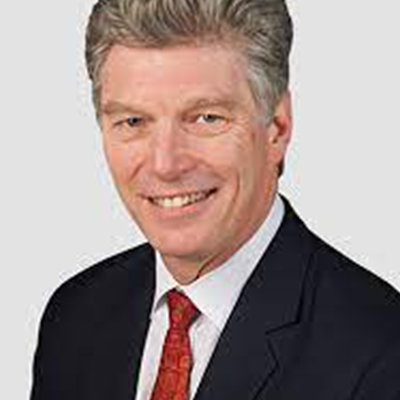
John J. Brandon is the senior director of The Asia Foundation’s International Relations programs, as well as the associate director of the Washington, DC office, Brandon managed the Foundation’s quadrennial “America’s Role in Asia” project in 2004 and 2008 as well as “Asian Views on America’s Role in Asia” in 2016, which examine U.S.-Asian relations in-depth and made recommendations on U.S. policy. His other responsibilities include monitoring U.S. policy toward the Asia-Pacific region and managing program activities in Washington. In 2007-2008 he participated in the Stanley Foundation project on “New Power Dynamics in Southeast Asia.” A Southeast Asia specialist by training, John Brandon’s opinion pieces on the region have appeared in the International Herald Tribune, The Christian Science Monitor, the Los Angeles Times, and other newspapers around the United States. He is the editor of Burma/Myanmar Towards the Twenty-First Century: The Dynamics of Continuity and Change (New York: Open Society Institute, 1997) a contributor to Burma: Prospects for a Democratic Future (Washington, DC: The Brookings Institution, 1998) and co-author of The 1990 Election in Myanmar (Washington, DC: The International Human Rights Law Group, 1990). He also served as a member of the Council of Foreign Relations Task Force study, chaired by former Senator Robert Kerrey, titled, The United States and Southeast Asia: A Policy Agenda for the New Administration (July 2001). In 2004-2005, Brandon served as a member of The Stanley Foundation’s project that addressed “United States Policy in Southeast Asia: Issues and Options.” He has a bachelor’s degree in History from Drew University and a master’s degree in Political Science and Southeast Asian studies from Northern Illinois University.
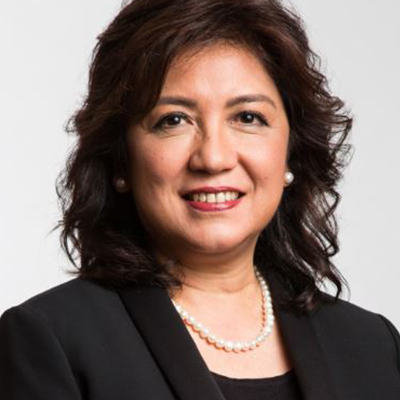
Dr. Mely Caballero-Anthony is Professor of International Relations and holds the President’s Chair for International Relations and Security Studies. She is also Head of the Centre for Non-Traditional Security (NTS) Studies at the S. Rajaratnam School of International Studies (RSIS), Nanyang Technological University, Singapore. Prof. Anthony’s research interests include regionalism and multilateralism in Asia-Pacific, human security and non-traditional security, nuclear security, conflict prevention and global governance. She has published extensively on a broad range of security issues in Asia-Pacific in peer-reviewed journals and international academic press. Her latest books, both single-authored and co-edited, include: Negotiating Governance on Non-Traditional Security in Southeast Asia and Beyond (New York: Columbia University Press, 2018), An Introduction to Non-Traditional Security Studies, (London: SAGE Publications Ltd, 2016), Asia on the Move (Japan: JCIE, 2015), and Human Security and Climate Change (London: Routledge, 2014). Prof. Anthony has led a number of global and regional research projects on international security and global governance. In 2017, she co-chaired the Global Reflection Group on the ‘Monopoly of the Use of Force- 2.0’ that brought together 21 scholars from Asia, Africa, Europe and the Americas that examined the nature of security provision in times of uncertainty. She was also the principal investigator of the MacArthur Asia Security Initiative (ASI) project of Internal Security Challenges in Asia and Cross-Border Implications and was Co-Chair of the Second Murdoch Commission on Food Security, Trade and Partnership in Asia. Prof Anthony has served as the Secretary-General of the Consortium on Non-Traditional Security Studies in Asia since 2008. From 2015-2017, she was Vice President at-large of the Governing Council of the International Studies Association (ISA) and is currently member of the ISA’s Global South Task Force. She had held visiting fellowship at the Elliott School of International Affairs, George Washington University in 2015. From 2013-2017, Prof Anthony was a member of the UN Secretary-General’s Advisory Board on Disarmament Matters (ABDM) and served at its Chairperson in 2016 and currently member of the Asia-Pacific Leadership Network on Nuclear Non-Proliferation (APLN). She was also Director of External Relations at the ASEAN Secretariat from 2011-2012.
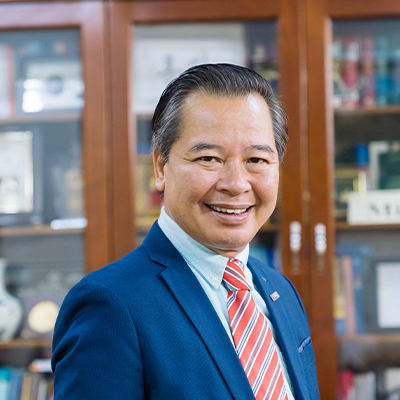
Dr. Quang Minh Pham is Professor of History and Politics, and Chair of Department of International Development Studies at the University of Social Sciences and Humanities (USSH), Vietnam National University-Hanoi. He got his PhD in Southeast Asian Studies from Humboldt University in Berlin, Germany in 2002. He was a visiting fellow at Pomona College (California), SciencePo (France), Waseda University (Japan), Chulalongkorn University (Thailand), just to name a few. His main teaching and research interests, among the other things, are world politics, international relations of Asia-Pacific, and Vietnam’s foreign policy. Currently he is a Fulbright fellow at Columbia University’s Weatherhead East Asian Institute.
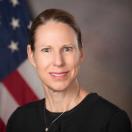
H.E. Piper Campbell served as the Head of the US Mission to the Association of Southeast Asian Nations (ASEAN) and Ambassador to Mongolia during a distinguished 30-year diplomatic career. She now teaches at American University's School of International Service, continuing to focus on the Indo-Pacific and multilateral diplomacy. Ambassador Campbell led the US Mission to ASEAN based in Jakarta from June – December 2018. In that capacity, she served as “Senior Official” in formal sessions of the East Asia Summit, ASEAN Regional Forum, and the Lower Mekong Initiative. She led a multi-agency team involved in a wide-range of activities from securing agreement with ASEAN Defense Ministers on holding the first US-ASEAN military exercise to opening a Young Southeast Asian Leadership Initiative (YSEALI) summit. Ambassador Campbell also served as Chief of Mission, US Embassy Ulaanbaatar from 2012-2015, in which capacity she supported negotiations on the development of Mongolia’s extractive industries and agreement on a $350 million US-Mongolia Millennium Challenge Compact. Ambassador Campbell retired in April 2019, with the rank of Minister Counselor.
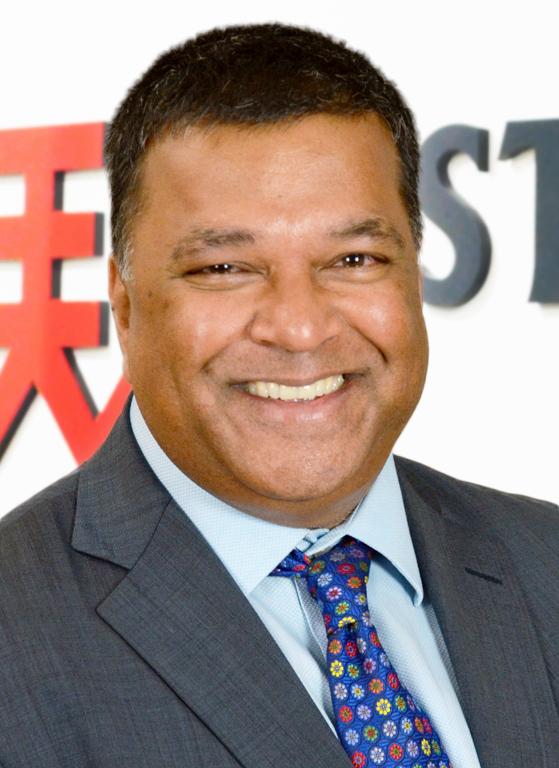
Dr. Satu P. Limaye is Vice President of the East-West Center and the Director of the East-West Center in Washington where he created and now directs the Asia Matters for America initiative and is the founding editor of the Asia Pacific Bulletin. He is also a Senior Advisor at CNA Corp (Center for Naval Analyses). He is a graduate of Georgetown University and received his doctorate from Oxford University (Magdalen College) where he was a George C. Marshall Scholar. He publishes and speaks widely on Indo-Pacific regional issues and supports various U.S. government, foundation, fellowship, and professional organizations. Among his current affiliations are Center for New American Security (CNAS) Task Force on the U.S.-Philippines Alliance, United States Institute of Peace (USIP) Senior Study Group on the North Pacific, Project 2049 Study Group on the U.S.-Australia Alliance, Korea Economic Institute (KEI) Advisory Council, and Global Taiwan Institute-Taiwan Asia Exchange Foundation project. Recent publications include: Southeast Asia’s choices: Economic, political, and geopolitical integration face complications, India in East Asia: Focused on the Quad and Border Disputes with China, and Maintaining the Technology Edge: Strengthening US and Indo-Pacific Alliances to Counter Chinese Technology Acquisition (with Rose Tenyotkin).

The East-West Center in Washington and American University’s ASEAN Studies Initiative
invite you to an Indo-Pacific Series Webinar:
Assessing US-ASEAN Relations:
The 2022 Special Summit and Beyond
Featuring:
Dr. Amitav Acharya (Welcome Remarks)
Chair, ASEAN Studies Initiative,
School of International Service, American University
Keynote Remarks
Mr. Daniel J. Kritenbrink
Assistant Secretary, Bureau of East Asian and Pacific Affairs,
US Department of State
Fireside Chat: Economic Outcomes of the Special Summit
Mr. Marc Mealy
Senior Vice President-Policy,
US-ASEAN Business Council
Mr. Edmund Sim,
Partner, Appleton Luff
Fireside Chat: Political-Security Outcomes of the Special Summit
Mr. Murray Hiebert
Senior Associate, Southeast Asia Program,
Center for Strategic and International Studies
Dr. Cheng-Chwee Kuik
Head and Associate Professor, Centre for Asian Studies (iKAS),
Institute of Malaysian and International Studies (IKMAS),
National University of Malaysia (UKM)
Mr. Kavi Chongkittavorn
Senior Fellow, Institute of Security and International Studies,
Chulalongkorn University
Fireside Chat: Socio-Cultural Outcomes of the Special Summit
Mr. John J. Brandon
Senior Director, International Relations Programs and Associate Director, Washington DC,
The Asia Foundation
Dr. Mely Caballero-Anthony
Professor of International Relations, Head of Centre for Non-Traditional Security Studies, and President’s Chair in International Relations and Security Studies,
S. Rajaratnam School of International Studies, Nanyang Technological University, Singapore
Dr. Quang Minh Pham
Professor of History and Politics, and Chair, Department of International Development Studies,
University of Social Sciences and Humanities (USSH), Vietnam National University-Hanoi &
Fulbright Fellow, Weatherhead East Asian Institute, Columbia University
Moderators
H.E. Piper Campbell
Acting Director, ASEAN Studies Initiative, School of International Service, American University &
Former Head of the US Mission to the Association of Southeast Asian Nations (ASEAN)
Dr. Satu P. Limaye
Vice President, East-West Center &
Director, East-West Center in Washington
East-West Center in Washington · Assessing US-ASEAN Relations: The 2022 Special Summit and Beyond
Following the recently concluded US-ASEAN Special Summit on May 12-13, 2022 in Washington, DC, US and regional experts discussed the extent to which the summit advanced US and ASEAN interests in the three main areas of ASEAN endeavors: political-security, economic, and socio-cultural.
SPEAKER BIOGRAPHIES

Dr. Amitav Acharya is Chair of the ASEAN Studies Initiative and Professor of International Relations at the School of International Service, American University, Washington, DC. He also holds the UNESCO Chair in Transnational Challenges and Governance since 2011. He was previously Professor of International Relations at York University in Toronto and Professor of Global Governance at the University of Bristol in the UK. He has also taught at the National University of Singapore and Nanyang Technological University, Singapore. He was a Fellow of the Asia Center, Harvard University, and Fellow of the Center for Business and Government at Harvard’s John F. Kennedy School of Government. Professor Acharya was elected to the Christensen Fellowship at St Catherine’s College in Oxford in 2012 and held the Nelson Mandela Visiting Professorship in International Relations at Rhodes University, South Africa for 2012-13. He was elected to be the President of the International Studies Association (ISA), the most recognized and influential global network of international studies scholar worldwide, for 2014-15. As the first ISA President from outside the West, he promoted the idea of Global IR, with the goal of injecting more diversity into the study of international relations and making it into a more dynamic and inclusive discipline and overcoming its hitherto neglect of the voices and experiences of the Global South. His areas of research and writing include Southeast Asian affairs, Asian security, international relations theory, and comparative regionalism. He has published widely on Southeast Asian and Asian regionalism, and the diffusion of ideas and norms in world politics.

Daniel J. Kritenbrink became Assistant Secretary of State for East Asian and Pacific Affairs on September 24, 2021. A career member of the Senior Foreign Service, Class of Career Minister, Kritenbrink has been an American diplomat since 1994. Assistant Secretary Kritenbrink previously served as U.S. Ambassador to the Socialist Republic of Vietnam (2017-2021), Senior Director for Asian Affairs at the National Security Council (2015-2017), and Deputy Chief of Mission at the U.S. Embassy in Beijing (2013-2015). He also completed multiple other overseas tours in Beijing, Tokyo, Sapporo, and Kuwait City. His other Washington assignments have included Director of the Office of Chinese and Mongolian Affairs at the Department of State and Staff Assistant to the Assistant Secretary of State for Near Eastern Affairs. A Nebraska native, Assistant Secretary Kritenbrink earned a master’s degree at the University of Virginia, and a bachelor’s degree at the University of Nebraska-Kearney. He speaks Chinese and Japanese.

Marc Mealy is the Senior Vice President-Policy at the US-ASEAN Business Council. He manages the production of the Council’s information products, coordinates advocacy efforts across our country and industry committees, and serves as the in-house lead on international trade policy. He joined the Council in 2003 as the Senior Director for Malaysia, Philippines and Brunei Affairs as well as Coordinator of the Council's ASEAN Financial Services Working Group. He was named the Vice President in 2010. Marc has over twenty years of experience in international trade and economics. He began his professional career in 1989 as an international economist with International Trade Policy Division of USDA's Foreign Agricultural Services. While at USDA he was accepted into the United States Foreign Service, and later went on to manage some of USDA’s largest commodity trade finance (GSM) and food assistance programs (PL-480) in Asia, Africa, and Eastern Europe for USDA’s Commodity Credit Corporation. In 1994-1996, he joined the African American Institute, an international non-profit NGO, as the Director of its Trade and Investment Program and later worked as a consultant to foreign government and international development NGO’s. Prior to joining the Council Marc spent four years inside the U.S. Congress. From 1999-2001 he was a member of the Professional Staff of the House International Relations Committee. From 2001 to 2003, he served as the international economic and foreign policy advisor to Congressmen Gregory Meeks of New York, a member of the House Foreign Affairs and Financial Services Committees. Marc holds a B.A. in Economics and Third World Studies from Oberlin College and an M.S. degree in Economics from the University of Florida.

Edmund Sim is a partner at Appleton Luff, an international law firm. He was an Adjunct Associate Professor at National University of Singapore Law School, where he created the world’s first course on ASEAN Economic Community (AEC) law. Ed has participated in more than 250 trade remedy proceedings and has advised government ministries in Malaysia, Thailand, Singapore, the Philippines, Vietnam, Laos, Cambodia, Timor-Leste, Indonesia and the ASEAN Secretariat. Ed advises the government of Timor-Leste on its accession to ASEAN. He co-authored The Foundation of the ASEAN Economic Community and Rules of Origin in ASEAN: A Way Forward (Cambridge, 2015) with Stefano Inama. He also served as Vice Chair and Treasurer of the American Chamber of Commerce in Singapore. During university, he worked at the Office of U.S. Vice President George H.W. Bush and the Office of the General Counsel, U.S. Treasury Department. Ed graduated from the University of Michigan Law School and Dartmouth College.

Murray Hiebert is a senior associate of the Southeast Asia Program at the Center for Strategic and International Studies (CSIS) in Washington, D.C. He earlier served as senior adviser and deputy director of the CSIS Southeast Asia Program. Prior to joining CSIS, Mr. Hiebert was senior director for Southeast Asia at the U.S. Chamber of Commerce. Earlier, he was a journalist in the China bureau of the Wall Street Journal. Prior to his posting to Beijing, he worked for the Wall Street Journal Asia and the Far Eastern Economic Review in Washington, reporting on U.S.-Asia relations. From 1995 to 1999, he was based in Kuala Lumpur for the Far Eastern Economic Review. In the early 1990s, he was based in Hanoi for the Review. He joined the Review's Bangkok bureau in 1986, covering developments in Vietnam, Cambodia, and Laos. Mr. Hiebert is the author of two books on Vietnam, Chasing the Tigers (Kodansha, 1996) and Vietnam Notebook (Review Publishing, 1993).

Dr. Cheng-Chwee Kuik (郭清水) is an Associate Professor and Head of the Centre for Asian Studies at the National University of Malaysia (UKM)’s Institute of Malaysian and International Studies (IKMAS), and concurrently a Nonresident Fellow at Johns Hopkins Foreign Policy Institute (FPI). He is co-founder of the East Asian International Relations (EAIR) Caucus, a research platform for exchange, engagement, and empowerment among foreign affairs professionals in Malaysia. He served as Head of the Writing Team for the Government of Malaysia’s inaugural Defence White Paper (2020). Previously he was a postdoctoral research associate at the Princeton-Harvard “China and the World” Program (CWP) and a visiting research fellow at Oxford's Department of Politics and International Relations. Dr. Kuik’s research concentrates on weaker states’ foreign policy behavior, regional multilateralism, East Asian security, China-ASEAN relations, and Malaysia’s external policy. His publications have appeared in peer-reviewed journals such as Journal of Contemporary China, Contemporary Southeast Asia, Chinese Journal of International Politics, Asian Security, China: An International Journal, Asian Politics and Policy, East Asian Policy, Shijie Jingji yu Zhengzhi, as well as edited books. He is co-author (with David M. Lampton and Selina Ho) of Rivers of Iron: Railroads and Chinese Power in Southeast Asia (University of California Press, October 2020), and co-editor (with Alice Ba and Sueo Sudo) of Institutionalizing East Asia: Mapping and Reconfiguring Regional Cooperation (Routledge 2016). Dr. Kuik's essay, “The Essence of Hedging” was awarded the biennial 2009 Michael Leifer Memorial Prize by the Institute of Southeast Asian Studies for the best article published in any of the three ISEAS journals. Cheng-Chwee is a regular invited speaker to international conferences and closed-door policy roundtables. His current projects include: hedging in international relations, geopolitics of infrastructure connectivity cooperation in Asia, and domestic sources of Southeast Asian states’ BRI engagement. Kuik serves on the editorial boards/committee of Contemporary Southeast Asia, Australian Journal of International Affairs, Asian Perspective, and Routledge’s “IR Theory and Practice in Asia” Book Series. He holds an M.Litt. from the University of St. Andrews, and a PhD from the Johns Hopkins University’s School of Advanced International Studies.

Kavi Chongkittavorn is a senior fellow at Chulalongkorn University’s Institute of Security and International Studies. He has been a journalist for over three decades with the Bangkok-based English-language newspaper The Nation, first as correspondent in Phnom Penh and Hanoi and later as leading writer and editor. He served as special assistant to the secretary general of ASEAN from 1995 to 1996 before returning to journalism. Kavi was a Nieman Fellow at Harvard University from 2001 to 2002 and president of the UNESCO Guillermo Carno World Press Freedom Prize jury from 2004 to 2007. He is the current affairs commentator of Nation News Channel’s One World Program. Kavi’s column, Regional Perspective, is in its 30th year.

John J. Brandon is the senior director of The Asia Foundation’s International Relations programs, as well as the associate director of the Washington, DC office, Brandon managed the Foundation’s quadrennial “America’s Role in Asia” project in 2004 and 2008 as well as “Asian Views on America’s Role in Asia” in 2016, which examine U.S.-Asian relations in-depth and made recommendations on U.S. policy. His other responsibilities include monitoring U.S. policy toward the Asia-Pacific region and managing program activities in Washington. In 2007-2008 he participated in the Stanley Foundation project on “New Power Dynamics in Southeast Asia.” A Southeast Asia specialist by training, John Brandon’s opinion pieces on the region have appeared in the International Herald Tribune, The Christian Science Monitor, the Los Angeles Times, and other newspapers around the United States. He is the editor of Burma/Myanmar Towards the Twenty-First Century: The Dynamics of Continuity and Change (New York: Open Society Institute, 1997) a contributor to Burma: Prospects for a Democratic Future (Washington, DC: The Brookings Institution, 1998) and co-author of The 1990 Election in Myanmar (Washington, DC: The International Human Rights Law Group, 1990). He also served as a member of the Council of Foreign Relations Task Force study, chaired by former Senator Robert Kerrey, titled, The United States and Southeast Asia: A Policy Agenda for the New Administration (July 2001). In 2004-2005, Brandon served as a member of The Stanley Foundation’s project that addressed “United States Policy in Southeast Asia: Issues and Options.” He has a bachelor’s degree in History from Drew University and a master’s degree in Political Science and Southeast Asian studies from Northern Illinois University.

Dr. Mely Caballero-Anthony is Professor of International Relations and holds the President’s Chair for International Relations and Security Studies. She is also Head of the Centre for Non-Traditional Security (NTS) Studies at the S. Rajaratnam School of International Studies (RSIS), Nanyang Technological University, Singapore. Prof. Anthony’s research interests include regionalism and multilateralism in Asia-Pacific, human security and non-traditional security, nuclear security, conflict prevention and global governance. She has published extensively on a broad range of security issues in Asia-Pacific in peer-reviewed journals and international academic press. Her latest books, both single-authored and co-edited, include: Negotiating Governance on Non-Traditional Security in Southeast Asia and Beyond (New York: Columbia University Press, 2018), An Introduction to Non-Traditional Security Studies, (London: SAGE Publications Ltd, 2016), Asia on the Move (Japan: JCIE, 2015), and Human Security and Climate Change (London: Routledge, 2014). Prof. Anthony has led a number of global and regional research projects on international security and global governance. In 2017, she co-chaired the Global Reflection Group on the ‘Monopoly of the Use of Force- 2.0’ that brought together 21 scholars from Asia, Africa, Europe and the Americas that examined the nature of security provision in times of uncertainty. She was also the principal investigator of the MacArthur Asia Security Initiative (ASI) project of Internal Security Challenges in Asia and Cross-Border Implications and was Co-Chair of the Second Murdoch Commission on Food Security, Trade and Partnership in Asia. Prof Anthony has served as the Secretary-General of the Consortium on Non-Traditional Security Studies in Asia since 2008. From 2015-2017, she was Vice President at-large of the Governing Council of the International Studies Association (ISA) and is currently member of the ISA’s Global South Task Force. She had held visiting fellowship at the Elliott School of International Affairs, George Washington University in 2015. From 2013-2017, Prof Anthony was a member of the UN Secretary-General’s Advisory Board on Disarmament Matters (ABDM) and served at its Chairperson in 2016 and currently member of the Asia-Pacific Leadership Network on Nuclear Non-Proliferation (APLN). She was also Director of External Relations at the ASEAN Secretariat from 2011-2012.

Dr. Quang Minh Pham is Professor of History and Politics, and Chair of Department of International Development Studies at the University of Social Sciences and Humanities (USSH), Vietnam National University-Hanoi. He got his PhD in Southeast Asian Studies from Humboldt University in Berlin, Germany in 2002. He was a visiting fellow at Pomona College (California), SciencePo (France), Waseda University (Japan), Chulalongkorn University (Thailand), just to name a few. His main teaching and research interests, among the other things, are world politics, international relations of Asia-Pacific, and Vietnam’s foreign policy. Currently he is a Fulbright fellow at Columbia University’s Weatherhead East Asian Institute.

H.E. Piper Campbell served as the Head of the US Mission to the Association of Southeast Asian Nations (ASEAN) and Ambassador to Mongolia during a distinguished 30-year diplomatic career. She now teaches at American University's School of International Service, continuing to focus on the Indo-Pacific and multilateral diplomacy. Ambassador Campbell led the US Mission to ASEAN based in Jakarta from June – December 2018. In that capacity, she served as “Senior Official” in formal sessions of the East Asia Summit, ASEAN Regional Forum, and the Lower Mekong Initiative. She led a multi-agency team involved in a wide-range of activities from securing agreement with ASEAN Defense Ministers on holding the first US-ASEAN military exercise to opening a Young Southeast Asian Leadership Initiative (YSEALI) summit. Ambassador Campbell also served as Chief of Mission, US Embassy Ulaanbaatar from 2012-2015, in which capacity she supported negotiations on the development of Mongolia’s extractive industries and agreement on a $350 million US-Mongolia Millennium Challenge Compact. Ambassador Campbell retired in April 2019, with the rank of Minister Counselor.

Dr. Satu P. Limaye is Vice President of the East-West Center and the Director of the East-West Center in Washington where he created and now directs the Asia Matters for America initiative and is the founding editor of the Asia Pacific Bulletin. He is also a Senior Advisor at CNA Corp (Center for Naval Analyses). He is a graduate of Georgetown University and received his doctorate from Oxford University (Magdalen College) where he was a George C. Marshall Scholar. He publishes and speaks widely on Indo-Pacific regional issues and supports various U.S. government, foundation, fellowship, and professional organizations. Among his current affiliations are Center for New American Security (CNAS) Task Force on the U.S.-Philippines Alliance, United States Institute of Peace (USIP) Senior Study Group on the North Pacific, Project 2049 Study Group on the U.S.-Australia Alliance, Korea Economic Institute (KEI) Advisory Council, and Global Taiwan Institute-Taiwan Asia Exchange Foundation project. Recent publications include: Southeast Asia’s choices: Economic, political, and geopolitical integration face complications, India in East Asia: Focused on the Quad and Border Disputes with China, and Maintaining the Technology Edge: Strengthening US and Indo-Pacific Alliances to Counter Chinese Technology Acquisition (with Rose Tenyotkin).








